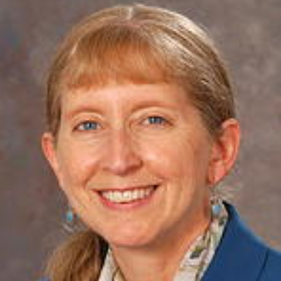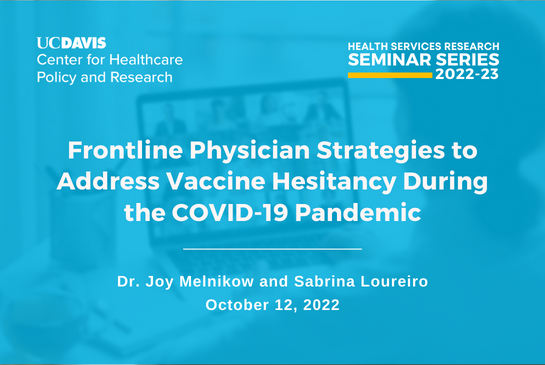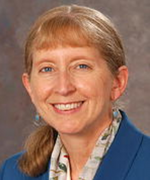COVID-19 Impacts on Frontline Physicians
The aim of this project was to give voice to physicians on the frontline of the COVID-19 pandemic.

The COVID-19 pandemic has presented an unprecedented healthcare challenge to the world. In the United States, the healthcare and public health responses have been complicated by misinformation and political polarization.
As cases increased rapidly, initial shortages of personal protective equipment, accurate and rapid testing, and lack of effective therapeutics hampered the ability of physicians to respond to the pandemic. Testing, therapeutics, and vaccines became available fairly quickly in the U.S., but misinformation and inequities in access have continued to challenge frontline physicians.
The COVID-19 Impacts Project examined how physicians most likely to care for patients infected with COVID-19 (Primary Care, Critical Care, Emergency Medicine, Hospitalists and Infectious Disease physicians) experienced the effects of the pandemic over time. A series of focus groups and interviews with frontline physicians in April-May 2020 informed survey development. A random sample of physicians from the AMA Masterfile was surveyed by email in four different time periods: June-July 2020, December 2020-January 2021, August 2021, and June 2022.
Listening to the voices of frontline physicians can improve responses to the ongoing pandemic and improve planning to organize safer and more equitable care in future pandemics. Attention to the wellbeing of healthcare providers is critical to the future of healthcare in the U.S."—Joy Melnikow, professor emeritus, UC Davis Department of Family and Community Medicine
The initial survey evaluated changes in practice driven by the pandemic, physician burnout, and sought input from respondents on needed changes to improve the pandemic response. Follow-up surveys evaluated changes in physician perspectives on the pandemic and physician burnout over time; physician strategies for conversations with vaccine hesitant patients, and in the third year of the pandemic, physician burnout and perceptions of workplace support.
Use of the AMA Masterfile as a sampling frame enabled comparisons of the characteristics of survey respondents and non-respondents, and weighting to ensure proportional representation of sampled specialties and to adjust for non-response.
A 2024 paper published in Vaccine explores physician communications strategies to address COVID-19 vaccine hesitancy. The findings suggest that many physicians engage with vaccine hesitant patients to encourage vaccine uptake, and that research is needed to define the most effective strategies.
A paper on physician burnout over the first year of the pandemic, suggesting rising burnout in most frontline specialties, was published in BMC Health Services Research in 2022. The research has received attention in news media as well as being cited in numerous papers, including a systematic review on physician burnout during the pandemic.
Workplace support interventions to address physician burnout was the topic of another paper published in BMC Health Services Research in 2024. Burnout increased over the course of the pandemic. Enhanced telehealth functionality was the only workplace intervention that was associated with lower physician burnout. Physician characteristics associated with lower burnout were having more than 10 years in practice and practicing critical care (compared with emergency medicine) burnout. Respondents attributed rising physician burnout to increased patient volume and staffing shortages while identifying greater financial the support and improved staffing as strategies to reduce burnout.
A paper published by JIMR Formative Research explored telemedicine uptake during the early stages of the COVID-19 pandemic. The proportion of physician respondents using telemedicine for more than 30% of their visits increased from 29.2% to 35.7% over first three to four months of the pandemic. Key factors that led to higher telemedicine use included telemedicine use prior to the pandemic, local case rates, and the clinician's specialty. Gender and years of practice did not significantly increase use of telemedicine. The findings highlight the role of perceived threat and available resources to promote telemedicine uptake, as well as the importance of preparation and support for future health crises.
Findings from the COVID-19 Impacts Project have been presented to the North American Primary Care Research Group, the Center for Healthcare Policy and Research (CHPR) Seminar Series, and to the Department of Family and Community Medicine at UC Davis Health.
The COVID-19 Impacts Project will continue to analyze and publish results. The project is led by Joy Melnikow, a CHPR affiliate and professor emeritus of family and community medicine.
-
Team leader
Joy Melnikow, M.D., M.P.H.
Professor Emeritus
UC Davis Department of Family and Community MedicineFaculty Affiliate
Center for Healthcare Policy and Research -
Jingwen Zhang, Ph.D., M.A.
Associate Professor
UC Davis Department of Communication -
Richard Kravitz, M.D., M.P.H., M.S.
Distinguished Professor of Medicine
UC Davis Department of Internal MedicineFaculty Affiliate
Center for Healthcare Policy and Research -
Michelle Hamline, M.D., Ph.D., M.A.S.
Assistant Professor
UC Davis Department of Pediatrics -
Melissa Gosdin, Ph.D.
Qualitative Research Analyst (Supervisor)
Center for Healthcare Policy and Research -

Andrew Padovani, Ph.D.
Project Director
National Agricultural Workers SurveyFormer Senior Statistician
Center for Healthcare Policy and Research -
Guibo Xing, Ph.D.
Principal Statistician
Center for Healthcare Policy and Research -
Marykate Miller, M.S.
Health Policy Analyst
Center for Healthcare Policy and Research -
Sabrina Loureiro, B.S.
Former Project Policy Analyst
Center for Healthcare Policy and Research














